Interview: Elana Bell
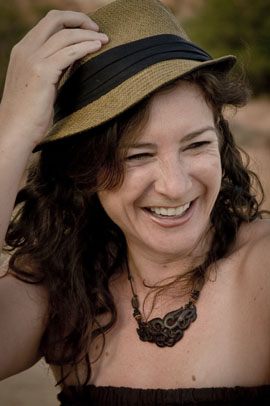
Photo by Jamie Clifford.
The evening you received the 2011 Walt Whitman Award for your first collection of poems, Eyes, Stones, you said that one of the questions you were exploring in these poems is “How can two narratives live in one body?” The first narrative, you said, began with your grandmother, who survived Auschwitz. The second narrative came through the time you spent with Palestinians in the West Bank. Can you say a bit more about the two narratives and how they have influenced your work?
My grandmother has always said that the only reason she survived the Holocaust was because she had this burning hope to go to Israel, the place she imagined would be a haven for Jews, unlike Poland where she was born and suffered tremendously as a Jew. I was incredibly curious about how this place where she had never been was able to sustain her through such horrific conditions.
I first visited Israel as an adult on a Taglit-Birthright Israel trip and fell totally in love with the land. I came back feeling passionate about my “homeland” and buying into the standard Jewish narrative about the formation of the state of Israel.
But when I started speaking to my left leaning poetry and political activist community in New York, and hearing the work of Palestinian poets like Suheir Hammad, it was clear that there was another narrative thread that I had not explored. I knew I had to go back. I traveled to the West Bank several times, got to know many Palestinians, stayed in their homes, developed relationships with them, heard their stories, and saw how they struggled with oppression. The book gave me a way to continue exploring these narratives and the tension they created inside of me.
How did you approach the development of these poems?
The poems began as a kind of conversation between my grandmother and the land of Israel—not the nation-state, but the physical land. I began to explore how the idea of this place sustained her through the Holocaust and how her experience of it changed once she actually got there. Israel was full of difficulties and complications, and after four years she and my grandfather had to leave. I also examined the relationship of historical and biblical figures to the land and interviewed contemporary Israelis and Palestinians who had a deep connection to the land. At the same time I examined my own relationship to the land and my hugely conflicted feelings about it. In addition to interviews and history, I used my personal experiences—journal entries, photographs, people’s stories collected during my travels—as the seeds for poems.
You’ve often been asked, “Whose side are you on?” How have you come to answer that question?
The more time I spent in the West Bank, the more Palestinians and Israelis I spoke to, the more humbled I felt about voicing my opinion. I have never lost a son to war or a suicide attack. I have never had my house bulldozed or watched my child be shot by a soldier. As far as which side I am on, I believe that there is only one side—that what is good for Israel and the Israelis, in the long term, is what is good for Palestine and Palestinians. This idea is messy and, I’ve been told, idealistic. But when I see the bravery of the people who live there, I am full of hope.
On one visit to the West Bank, I heard Sami Awad, who is the director of Holy Land Trust, a Palestinian organization committed to nonviolent resistance, speak about his trip to Auschwitz. “I went because I wanted to understand the fear of annihilation that permeates the core psyche of the Jewish people, no matter how powerful their current army is,” he said. “Being there, meditating on the floor of the death camps, I realized that until we include that awareness in the work that we are doing, our cause will not succeed.”
Elana Rozenman, who founded Trust Emun, an interfaith peace building organization, said that after her son survived a suicide bomb attack on Ben Yehuda Street, “It was clear to me that God was sending me a wake up call, that I could no longer live in my safe Orthodox bubble, and that I needed to meet Palestinian women, mothers who have also lost their children and husbands to the violence. The idea that the leaders would just take care of everything was clearly not working.”
I am on the side of these human beings. I am on the side of the builders.
What has changed for you since you won the Whitman Award for Eyes, Stones?
Even before publication of the book, winning the Whitman Award has provided opportunities. It has enabled me to connect with and have my work read by poets whom I greatly admire, for example, Naomi Shihab Nye. Additionally, I was recently asked to do a reading with Gerald Stern to celebrate the life and work of Emma Lazarus at the Jewish Heritage Museum. I am honored to read with a poet I have loved since I was in high school and to consider Emma Lazarus’ work more deeply. I also think that being able to list the award in my bio when I sent out some of the individual poems may have encouraged some editors to publish them (of course, this is speculation).
But the most exciting aspect of winning the award so far is that it gave me the courage to realize a long-time artistic vision. Many of the poems in Eyes, Stones are persona poems, in the voices of contemporary and historical characters. Sometime during the process of creating this book, I knew that I wanted to create a performance version based on the text. When I found out that I’d won the award, I decided that I would create a performance piece with dancers and musicians addressing the question, “How can two narratives exist in one body?” The piece is now in rehearsal and will debut at the book release party. It is one of the most exciting creative experiences I have ever had.
Did the award have an effect on any decisions you made as a writer, on the path you chose to take in life, or in your work?
Winning the award was sort of like a steroid shot—it has given me courage to begin applying for college teaching positions, to create a website, and to take new artistic risks. I also have visions of the work I want to do as an educator, using creative writing as a tool for people from regions in conflict. Winning the award gives me a sense of confidence to begin to develop that curriculum and pedagogy.
For your work as a public school teacher who nurtures students in their writing, you received a Touching Lives Fellowship to attend the 2011 AROHO retreat. What did that experience give you?
It was a wonderful gift. I was given the opportunity to connect with many amazing women writers. I was given the chance to just follow my own mind’s wanderings with no imposed schedule or expectations. This came on the heels of a very challenging year in the classroom, so I was particularly grateful. I would not have been able to attend the retreat if I had not received the fellowship.
Can you tell us about a memorable idea or exercise from the AROHO retreat?
When Bhanu Kapil gave her amazing poetry talk and shared her process and the questions she used to develop The Vertical Interrogation of Strangers, and then had us answer those questions with each other—that was such a powerful reminder of the necessity to follow your instincts and obsessions as a writer. It’s as important as the actual sitting down at the desk.
Is there a specific woman writer who inspires you?
Carolyn Forché is a huge inspiration for me, both because of the urgency and risk taking in her subject matter—she often writes poetry that is deeply concerned with politics and social justice—and because she has allowed her style of writing to change. With each book she challenges herself to experiment with new and different forms.
How would you describe your typical writing day?
When I am in a GOOD rhythm and I have total freedom of time, my typical writing schedule is to wake up, do yoga or meditate, eat breakfast and then WRITE! I like to start with free writing or spillage (no censor, no plan) for thirty minutes. Then I like to do some sort of writing exercise; usually I’ll pull a line from a poem I love as a jumping off point and work with that. Then, I pull out poems I am working on; either I go back in my notebook and read through what I have written and find something I want to develop, or I pull out a piece that I have started and go back to work on it.
What are you working on now?
Right now I am preparing for the book party, which will not only celebrate the release of Eyes, Stones, but also provide an opportunity for artists in multiple disciplines to engage in conversation, and give people a chance to learn about and support organizations that do grass roots peace building work in Israel and Palestine, organizations that manifest my deepest values and beliefs about the kind of world that is possible.
Since Eyes, Stones was accepted for publication, it has been a challenge for me to find a focus for my writing, especially since Eyes, Stones is such a theme-specific project. Right now I am just diving into the vast ocean of my conscious/subconscious mind, swimming in it, keeping up a daily writing practice, seeing what happens. I am writing a lot about my relationship to my mother and her depression and my questions about how hereditary it is, how it travels through my DNA, what she carried from being the daughter of Holocaust survivors. This work is very different than the poetry in Eyes, Stones. We’ll see where it takes me.
Elana Bell is a poet, performer, and educator. Her first collection of poetry, Eyes, Stones, (Louisiana State University Press, April 2012) was selected by Fanny Howe as the winner of the 2011 Walt Whitman Award. Elana is the recipient of grants and fellowships from the Jerome Foundation, the Edward Albee Foundation, the AROHO Foundation, and the Drisha Institute. Her work has recently appeared in Harvard Review, Massachusetts Review, CALYX Journal, and elsewhere. Elana has led creative writing workshops for women in prison, for educators, for high school students in Israel and Palestine and throughout the five boroughs of New York City, as well as for the pioneering peace building and leadership organization, Seeds of Peace. She currently serves as the writer-in-residence for the Bronx Academy of Letters and lives in Brooklyn, New York.
- Learn more about Elana Bell.
- Watch a video of Elana reading three poems at the Bowery Poetry Club (8 min., 44 sec.):
- Learn about the Walt Whitman Award.
- Learn about the peace organizations mentioned in this interview: Just Vision; Holy Land Trust; Trust Emun; Seeds of Peace.
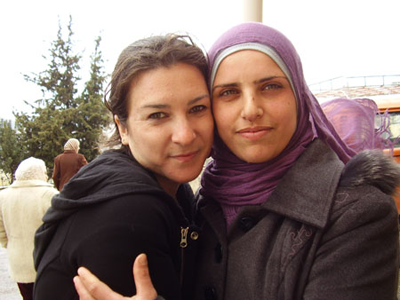
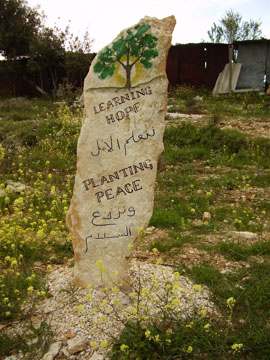
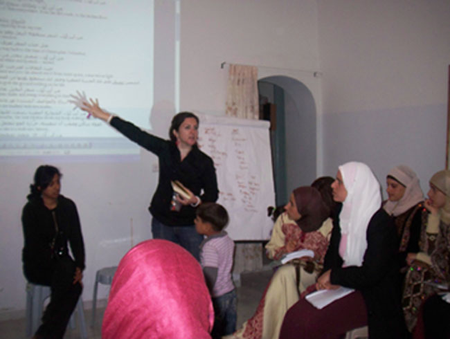

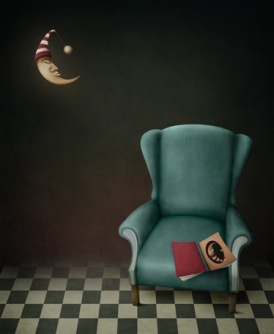
Barbara,
Your Elana Bell interview was most inspiring. Elana is inspiring. You are inspiring. I’m delighted to have you as my daughter. Keep up the good work!
Love,
Dad
Thanks, Dad. What a sweet comment. Elana is inspiring, and you are too!